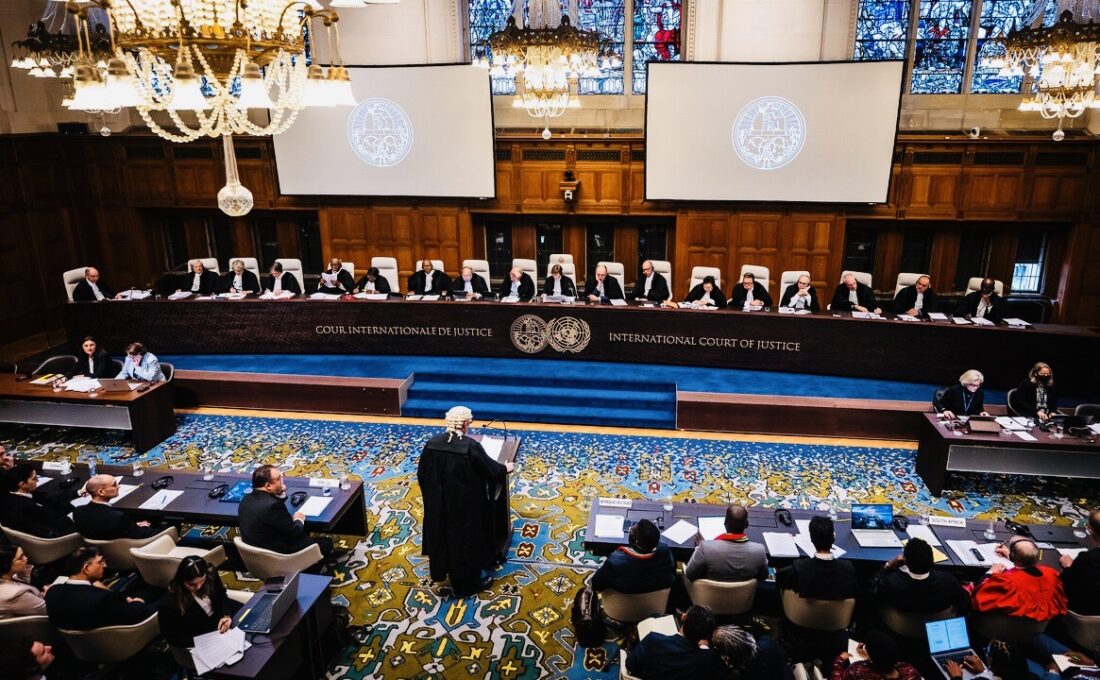The timing was not accidental.
On July 18, a day before the International Court of Justice in The Hague issued a sharp but non-binding advisory opinion stating that Israel’s occupation of the West Bank was illegal and should be terminated as soon as possible, the Knesset passed a motion, supported by Prime Minister Benjamin Netanyahu and his coalition partners, overwhelmingly rejecting Palestinian statehood, even as part of a negotiated settlement with the Palestinians.
Netanyahu’s position on this pivotal issue was predictable. Realizing that the court’s resolution would not be in Israel’s favor, he sought to render it irrelevant. In addition, he and his allies were all too eager to publicize their staunch opposition to a Palestinian state in the West Bank and the Gaza Strip, claiming it would pose “an existential threat” to Israel, destabilize the region, degenerate into “a radical Islamic terror base,” and would be “a reward for terrorism.”

The Knesset motion was introduced by Gideon Sa’ar, a right-wing parliamentarian who sits in the opposition but shares Netanyahu’s views. It won the approval of 68 parliamentarians but was opposed by nine Knesset members, all of whom were from Israeli Arab parties.
Tellingly enough, Benny Gantz, the leader of the centrist National Unity Party, voted for the motion. Yair Lapid, the head of the centrist Yesh Atid Party and a former prime minister, left the chamber before the vote, even though he theoretically backs a two-state solution. The left-of-center Labor Party, which supposedly supports a two-state solution, abstained.

Yair Lapid
The positions they adopted confirmed the cynical Palestinian argument that the differences between mainstream Israeli political parties on Palestinian statehood are a lot like the imperceptible differences between Coca Cola and Pepsi Cola.
When push comes to shove, there are relatively few Jewish politicians in Israel who are consistently ready to endorse a two-state solution within the framework of a diplomatic process.
Israelis are understandably wary of the notion of Palestinian statehood after the game-changing October 7 attack by Hamas terrorists. Israelis are still traumatized by Hamas’ murderous rampage. They fear and mistrust Palestinian motives and intentions, particularly in light of surveys indicating that a healthy majority of Palestinians in Gaza and the West Bank endorsed Hamas’ rampage and support the concept of armed struggle against Israel.
The result of these surveys are surely disillusioning. But if Israelis are ever to coexist with the five million Palestinians in the West Bank and Gaza, as they should and must, they will have to face reality.
In the absence of a comprehensive two-state solution which takes account of Israel’s vital security interests, Israeli forces will continue to occupy the West Bank, further alienating and angering a resentful Palestinian population. This is a recipe for instability, chaos, violence and bloodshed.
Israelis who believe they can live peacefully in a bubble without resolving the protracted and seething Palestinian question are lulling themselves into complacency and fooling themselves.
Since Israel’s seizure of the West Bank during the 1967 Six Day War, the Palestinians have made it abundantly clear that they will never submit to an occupation that deprives them of the inalienable right to independence and sovereignty. Whether Israel likes it or not, the Palestinians are a people with a defined history and an expressive culture who yearn for statehood. In pursuit of this goal, they have turned to terrorism and diplomacy, both of which avenues have gotten them no nearer to this objective.
Yet every single major power from the United States and Russia to Britain and Germany, and virtually every member state of the United Nations from Albania to Zambia, support a two-state solution, the only viable, practical and just pathway to peace, justice and coexistence.
Of course there are Palestinians who reject Israel’s existence and demand a single Palestinian state in its place instead of a two-state solution. Hamas and Palestinian Islamic Jihad exemplify this kind of nihilistic radicalism, but their extremism has exacted a heavy toll on Palestinian lives and achieved nothing of real and lasting value, as the ongoing Israel-Hamas war graphically and sadly illustrates.
The ill-conceived motion passed by the Knesset a few days ago categorically rejecting Palestinian statehood plays into Hamas’ hands precisely because it presents Palestinians with no sound alternative but to engage in terrorism and scoff at diplomacy.
Contrary to the beliefs of Netanyahu’s government, the most right-wing since the formation of the Jewish state in 1948, the advent of Palestinian statehood would not necessarily be a dire threat to Israel, but rather a calming and historic event that could well bring stability to the region and finally end Israel’s bloody conflict with the Palestinians.
Certainly, a Palestinian state should not be regarded as “a reward for terrorism.” In fact, the opposite is true. Palestinian statehood would be a bold rebuke to Hamas and its benefactor, Iran. It might also jolt radicalized Palestinian university students in Canada, the United States and Europe who shamelessly parrot Hamas’ misguided, incendiary and dangerous “river the the sea” slogan.
Israel’s stubborn and counter-productive refusal to come to terms with the inevitable, a two-state solution, has consequences. On July 19, the International Court of Justice issued a ruling that further isolates Israel with respect to its occupation of the West Bank.
Netanyahu dismissed it as a “false decision” that distorts the “historical truth” and ignores Israel’s connection to its ancestral land. The Jewish people’s ties with Judea and Samaria are historically indisputable, and Jews must be allowed to live there should Israel and the Palestinians sign a peace agreement in the future. But given the size of the Palestinian population in Gaza and the West Bank, Israel cannot afford to behave like a 19th century colonial occupier.
As the International Court of Justice declared, Israel’s policy of settlement building and expansion in the West Bank is legally unsustainable since it requires the confiscation or requisition of large areas of land, much to the detriment of the Palestinians. Israel’s settlement policy therefore violates international law, the court decided.
And since Israeli settlements “are not temporary in character,” they contravene the Fourth Geneva Convention because “belligerent occupations” are supposed to be of short duration, the court said.
Israeli policies and practices, it concluded, are designed to preserve the status quo. It cited the “maintenance and expansion of settlements,” the construction of associated infrastructure” and the separation wall, “the exploitation of natural resources, the proclamation of Jerusalem as Israel’s capital, and the comprehensive application of Israeli domestic law in East Jerusalem and its extensive application in the West Bank.”
These policies and practices are intended to entrench Israeli control of the occupied Palestinians territories and create “irreversible effects on the ground.”
This incorrigible Israeli government has no intention of listening to or abiding by the court’s advisory. Nor will it cooperate in the eventual establishment of a Palestinian state. That is crystal clear.
Only Israeli voters can choose a government that will deal with the Palestinian problem realistically. One can only hope they exercise their democratic prerogative in the next general election.
